USDOT Thriving Communities Program: Providence, RI
15 minutes Date Launched/Enacted: May 15, 2025 Date Published: May 21, 2025

About the Thriving Communities Program (TCP)
The Thriving Communities Program (TCP) funds tailored technical assistance to under-resourced and disadvantaged communities, helping them better access historic infrastructure investments and deliver transformative projects. The USDOT FY 2022 Thriving Communities Program supports 64 communities across the country with access to a team of capacity builders to develop innovative community engagement methods, identify funding opportunities, and grow long-term capacity to develop and deliver transportation projects that strengthen communities.
TCP Complete Neighborhoods Community of Practice
TCP Communities are grouped into three Communities of Practice: Main Streets, Networked Communities, and Complete Neighborhoods. The 15 communities included under the Complete Neighborhoods Community of Practice are:
| Atlantic Beach, SC | Isabela, PR | Santa Cruz, CA |
| Billings, MT | Lansing, MI | St. Louis County, MO |
| Decatur, IL | Lima, OH | Suffolk, NY |
| East Orange, NJ | Providence, RI | Sumter, SC |
| Indianapolis, IN | Roanoke, VA | Waukegan, IL |
The US Department of Transportation (USDOT) selected a capacity building team led by RMI, including: the American Council for Energy-Efficient Economy (ACEEE), Equitable Cities, Nelson\Nygaard, and the Shared-Use Mobility Center (SUMC), to provide technical assistance to these 15 communities.

A Snapshot of Providence, Rhode Island
Providence is the capital city of Rhode Island, located at the mouth of the Providence River and close to the Massachusetts border. Providence is the most populous city in the state, with an estimated 190,791 residents in 2023 (ACS 1-year, 2023). Providence was a major seaport during the colonial era and shifted to textile manufacturing when the city industrialized. As the home to eight hospitals and eight colleges or universities, the most common industries in Providence today include healthcare and higher education (ACS 5-year, 2023). The median household income in Providence is $66,772 and 20.1% of Providence residents live below the poverty line. Residents spend on average $11,215 annually on transportation costs, about 14% of their income, and about 21% of their income on housing (H+T Index).
Smith Hill, the study area for this project, is a mixed-use and multimodal neighborhood in Providence with legacies of disinvestment, highway development projects, and redlining that have contributed to its current condition as an economically disadvantaged area with poor health outcomes and a lack of affordable housing. The neighborhood’s population is diverse, with 79% people of color and 28% of residents born outside the United States.

Location of Providence within Rhode Island. Credit: Google Maps
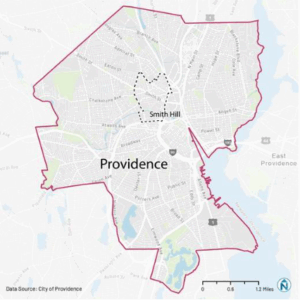
Map of Providence, RI, highlighting Smith Hill, the study area for this project. Credit: Nelson\Nygaard
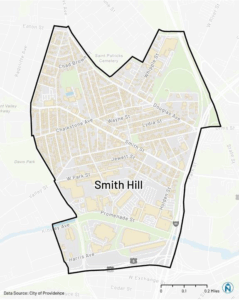
Smith Hill neighborhood. Credit: Nelson\Nygaard
Key Partners
The City of Providence Planning Department worked with several key partners through the Thriving Communities Program.
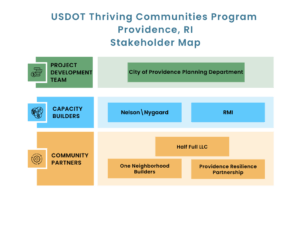
Stakeholder map. Credit: SUMC
The role of the Capacity Builders was to leverage existing resources and community partners within the City of Providence to grow local engagement in the transportation programs and goals outlined in the Smith Street Revitalization Plan.
Smith Street Revitalization Plan
Prior to the City’s participation in the Thriving Communities Program, a coalition of community-based partners in Smith Hill conducted a neighborhood planning process from fall 2019 to spring 2020 with help from the local City Councilwoman, the City of Providence’s Department of Planning and Development, and an outside planning consultant. The effort resulted in the Smith Street Revitalization Plan (SSRP), which mapped out a community vision for future development and identified strategies for neighborhood improvements in topics such as streetscape and mobility, housing and economic development, and cultural and arts investments.
Priority projects outlined in the plan included establishing a merchant’s association for the Smith Hill neighborhood, the creation of a community bulletin board, holding a Taste of Smith Hill festival, creating a business façade improvement program, implementing public art and signage improvements, and creating a neighborhood porch lighting program.
The draft plan was presented to the community on May 14, 2020. Comments and feedback from the community were collected via email until May 18, 2020, and incorporated into the final plan.
The Smith Hill Community Development Corporation (SHCDC) intended to be a key partner for implementing multiple projects in the Revitalization Plan, but implementation was put on hold due to the COVID-19 pandemic and at that time, SHCDC ceased operations. The City and community partners were able to leverage the Thriving Communities Program to begin addressing key issues outlined in the plan, focusing on the establishment of a merchant’s association to act as a catalyst for other initiatives named in the plan, such as the Taste of Smith Hill festival and a business façade improvement program.
Activities through the Thriving Communities Program
Site Visit
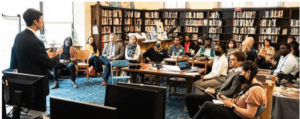
Mayor Brett Smiley addresses site visit attendees. Credit: Stephen Ide/ONE Neighborhood Builders
The Capacity Building team, led by Nelson\Nygaard in the city of Providence, hosted a site visit in Smith Hill on February 27-28, 2024 at the Smith Hill Library. The project development team, capacity builders, and community partners attended and participated in the site visit, including Jessica Lance, Ryan Dickerson, and Timothy Shea with the City, and community partners Dominique Resendes from One Neighborhood Builders (ONB), Wole Akinbi from Half Full LLC, and Michele Jalbert from Providence Resilience Partnership. Other participants at the site visit included local stakeholders such as City Councilor Althea Graves, Mayor Brett Smiley, State Senator Jake Bissaillon, and representatives from the Rhode Island Department of Health (RIDOH). Steering Committee members who had been involved in the SSRP also attended.
The primary purpose of the site visit was for the Capacity Building team to re-engage with the Steering Committee that helped to develop the Smith Street Revitalization Plan (SSRP) in 2019. The SSRP identified transportation, community revitalization, and economic development priorities for the neighborhood. In the five years since the plan was approved, many of the community’s top priorities have changed, though the workshop conducted during the site visit confirmed that many needs throughout Smith Hill and Providence remain the same. The top priorities identified through the day one workshop include beautification and placemaking, improving mobility and safety, offering greater affordable housing, and community development.
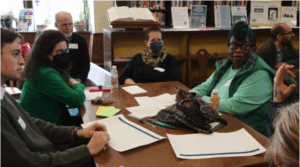
Local stakeholders attended the first site visit in Providence, RI. Credit: Nelson\Nygaard
Additionally, the City secured matching funds from the City’s ARPA allocation, doubling an initial $60,000 investment to $120,000. A successful site visit further strengthened engagement, bringing local leaders together to outline priority projects and even drawing the mayor’s attention.
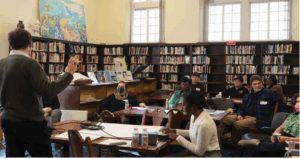
Site visit with the City of Providence and community partners in February 2024. Credit: Nelson\Nygaard
Merchants Association Convening Activities
Recognizing budget constraints, the team prioritized the Merchants Association as an organizing force to tackle smaller, immediate projects rather than relying solely on external funding. Direct funding from the TCP program was instrumental in building a coalition to successfully launch the 02908 Merchants Association. The team viewed the Merchants Association as a catalyst for multiple project priorities in the SSRP:
- Launching a Community Bulletin Board
- Creating a business façade improvement program
- Implementing public art and signage improvements
- Hosting a Taste of Smith Hill Festival
Community partners leveraged their connections within the Smith Hill neighborhood to get local business leaders involved in the merchant’s association launch. Since launching, the project team helped to formally establish the 02908 Merchants Association, which has since recruited interns and includes 35 registered local businesses as of April 2025. The City also secured matching funds from the City’s ARPA allocation, doubling an initial $60,000 investment for the association to $120,000.
The Association currently holds regular monthly meetings and has successfully hosted community events like the St. Patrick’s Parade, and the association will be participating in the Smith Hill Block Party in August 2025. The organization has also received local news coverage about the organization’s launch and upcoming plans. A major accomplishment for the association is planning for the Taste of 02908 with other community partners and the event is expected to take place in September 2025.
Bike Distribution and Repair Project Support
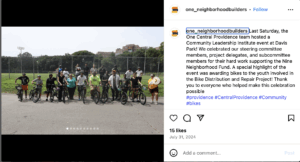
Community event in Providence. Image: One Neighborhood Builders Instagram
One Neighborhood Builders (ONB) hosted a community event in July 2024 supported by the Nine Neighborhood Fund, the organization’s participatory budgeting initiative. ONB worked with the Chad Brown Alumni Association to provide bike repair services and distribute free bikes to low-income residents in the 02908 and 02909 neighborhoods. The Capacity Building team provided support on potential bike education materials for the event and coordination with Half Full and the City.
Library Grant Application
In February 2024, the Capacity Builder team supported a grant opportunity hosted by the Center for Chronic Disease Management Healthy Eating & Active Living Program. The grant was for the Rhode Island Streets Transformation Project Mini-Grant with the Rhode Island Department of Health.
With Smith Hill Library and other local organizations, the Capacity Builder team sought funding for microgrants for three activities that aim to advance projects from the Smith Street Revitalization Plan related to beautification, mobility, and community development, to Install Little Free Libraries throughout the neighborhood to encourage reading and increase mobility options. The project sought to build four mini libraries in Father Lennon Park, Davis Park, and Hasset Memorial Candace Park to fortify stronger active transportation connections between them and Harry Kizirian Elementary and Nathanael Greene Middle Schools. In addition to the supplemental classroom learning and curricula the Smith Hill Library provides, this grant specifically sought to provide a host of creative programs centered around the following activities:
Mini Library Construction: During this activity, community members would come together to design, build, and decorate mini libraries. These small structures would be placed in accessible locations throughout the community, such as parks, with literature related to green space, gardening, and mobility. The process of creating mini libraries not only promotes teamwork and creativity but also instills a sense of responsibility and stewardship for the shared resource. Once the mini libraries are installed, children and community members are encouraged to donate books and take books to read, fostering a culture of sharing and learning within the community.
Greenway Painting: A community activity for school children, this creative and educational initiative involves students in beautifying and enhancing public green spaces, such as parks or trails, through art. During this activity, students are provided with eco-friendly paints and brushes, and they work together to create colorful murals or designs on designated areas along the greenway.
Group Bike Rides: Following the painted greenways, local bicycle organizations could utilize these routes to gain a deeper appreciation for the community and connectivity to nature and the outdoors. Additionally, the painted murals would serve as a visual reminder of the importance of preserving and protecting green spaces and their connection to the main library and mini libraries for neighbors to enjoy.
Though the team was not successful in winning the grant, the application process galvanized relationships and activated interest in initiating greenway and bicycle infrastructure for local students. It also organized the group and prepared for future grant opportunities for increased funding.
Next Steps for TCP Support and Future Merchants Association Programming
The Capacity Building team has been working with the City of Providence to support the Merchants Association since the organization launched in October 2024. The team was able to leverage support from the Thriving Communities Program to launch the Merchants Association, developing a contract agreement with ONB. The City was able to double the TCP investment and supplemented this support with ARPA funding through a separate contract with ONB.
Funding Opportunities
The City of Providence applied for RAISE funding in 2024 for connectivity and safety improvements on North Main Street without assistance from the Capacity Building team. While their application was unsuccessful, the process united the community around shared goals, including improving active transportation routes for children traveling between the library and local parks.
Direct funding also enabled impactful community initiatives, such as a Turkey Drive, which provided essential support to local families. There are additional opportunities for funding through the technical assistance program in Skills for Rhode Island’s Future, a non-profit that connects businesses with unemployed job seekers. Anthony Aquino, who formerly worked with the City of Providence, currently works with Skills for Rhode Island’s Future and has been coordinating with Wole Akinbi of Half Full on a regular basis about potential funding opportunities through the program. Overall, direct funding has been a critical catalyst, empowering the team to implement key projects and foster long-term community development.
Key Partners
- One Neighborhood Builders is an affordable housing developer that has been working in Providence for more than 30 years. The organization also leads Central Providence Opportunities: A Health Equity Zone, which is a collaboration of community stakeholders that work together to identify and eliminate barriers to health in the 02908 and 02909 zip codes in Providence.
- Providence Resilience Partnership is a non-profit organization that focuses on collaborating with businesses, academic institutions, nonprofits, and community groups to catalyze strategic planning and implementation to address climate change impacts.
- Half Full, LLC has been operating in Providence for more than 20 years, providing team building, leadership development, and cultural and organizational development to individuals and teams throughout Providence.
- Nelson\Nygaard Associates is the Thriving Communities Program (TCP) subcontractor.
- RMI is an independent, nonpartisan, nonprofit that transforms global energy systems through market-driven solutions to align with a 1.5°C future and secure a clean, prosperous, zero-carbon future for all. The nonprofit serves as prime contractor for TCP.
Related Resources
- Smith Street Revitalization Plan
- Home | The02908 MA
- Providence Business News coverage of the Merchant’s Association: 02908 Merchant Association launches to connect, inform North End businesses
Capacity building efforts through the Thriving Communities Program are continuing until May 2025. The Capacity Builder team will conduct more technical assistance activities and will update this case study as the program progresses.